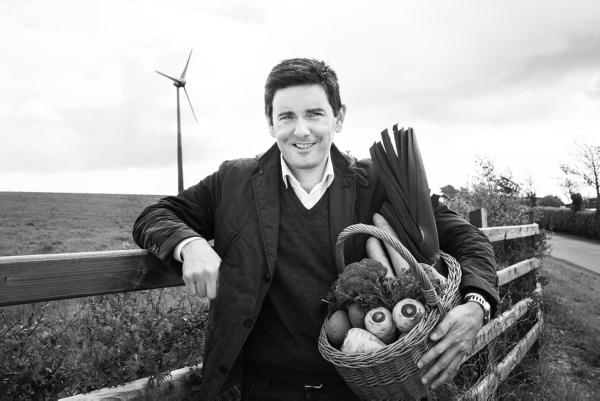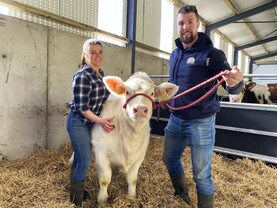When faced with a drop in beef meal sales following the horse meat scandal, Ed Spelman, managing mirector of Ballymaguire Foods (BMF), needed to be proactive to turn the company around. Although all their beef was Irish, it was death by association when the market for cottage pie and lasagne decreased overnight.
The solution was staring at him from right over the hedge. What was needed was full traceability from farm to fork and the company decided to add a cattle-feeding unit to the plant. This would guarantee traceability of all its own beef and ensure that product integrity was maintained.
Ballymaguire Foods is the largest chilled food producer in Ireland, with a 22,000 sq ft facility in north Co Dublin and it employs 200 people. In 2012, Spelman, a trained chef with industry expertise, joined forces with Michael and Gabriel Hoey. The Hoey brothers, better known for their Country Crest business, founded BMF in 2008 to complement the potato company.
Initially, BMF produced a small selection of its own branded lines, including mash and raw potatoes. But it has evolved to become a producer of retail own-brand products. Ed explains that BMF produces a range of ready meals, from Irish pork belly to supreme honey roast vegetables, for the own brand, retail and food service industry.
The market
The meal solutions market is relatively new here. The chilled ready meals market is worth in excess of €40m in Ireland. Buying habits have changed, with consumers buying less and more often from smaller convenience stores. People are now more travelled and expect more ‘exotic’ foods, like couscous.
Ed explains that people are dining out less and instead treating themselves to a good quality ready meal. There is a lot more engagement by the customer with the ready meal. They may cook some of the meal themselves, like the rice, and not feel guilty.
He continues that consumers are now less concerned with fancy packaging and are putting more emphasis on the quality of the food. Ed says BMF saw the potential of time-saving foods, like prepared meals and meal components, in response to the shift in consumer lifestyles but also a gap in the market for good quality pre-prepared meals.
When asked why not develop a brand, Ed explains that it needs large continued investment and that requires deep pockets. He adds that brands that were created years ago have been successful, but that it is more difficult for new brands today due to much tighter margins in the sector. Older brands have built up loyalty with a strong DNA so they will continue to be successful. Another observation he makes, has been the increasing quality of own brand.
BMF aims to change the perception of traditional ready meals which has, he feels, hurt the wider chilled convenience food sector.
Ed says Irish and British consumers want trusted, quality, wholesome ingredients. Frozen product is not working.
The food business needs huge investment. Ed says they were faced with the issue of “get big or get out” and that many small food companies are closing due to tighter credit and access to finance.
BMF has strong partnerships with the likes of Musgraves, who own the SuperValu, Superquinn and Centra brands. Recently BMF has also built partnerships with Budgens in Britain, with 20% of BMF products now being exported there.
In relation to the power of supermarkets, Ed explains that strong relationships need to be built with these large customers.
He says supermarkets have changed. Since the horsemeat scandal they realise that it is now not enough to just have images of farmers in the aisles. Ed explains that BMF operates an open partnership with the retailers they work alongside on a day-to-day basis.
He does not see the threat of a retailer leaving for a cheaper producer for a number of reasons:
They want to source locally fresh produce. It’s about long-term relationships. It’s about quality ingredients that taste great. Sourcing
Ed still dons his chef’s whites to develop new dishes. He is a firm believer in the quality of home-grown ingredients and uses Irish suppliers wherever possible. Ed explains that the meals are handmade and use ingredients you would find in any farmhouse kitchen.
Full traceability
With the addition of the new cattle rearing unit, the company plans to kill 40 cattle per week for its ready meals. The unit will house 350 cattle. Traceability will go beyond the animal as the feed will be also be analysed and frozen samples kept. The finished animals will be DNA-tested as they leave the farm and also when the meat arrives back. This will provide full traceability along the supply chain. All of the beef in the company’s meals will come from this unit in the future.
Ed believes consumption of Irish food within the country can be improved. He says a large proportion of produce in catering is imported. He believes that Government agencies could buy a lot more locally produced foods, thus creating more jobs locally. He is confident that the price would be competitive.
Ed sees that sustainable production and overall operational efficiencies are key strengths of the business. This is a scale business and economies of scale drive the efficiencies.
The goal is to double the size of the current production facility over the next few years. This will be driven by continued product innovation and entry into the British market.
When faced with a drop in beef meal sales following the horse meat scandal, Ed Spelman, managing mirector of Ballymaguire Foods (BMF), needed to be proactive to turn the company around. Although all their beef was Irish, it was death by association when the market for cottage pie and lasagne decreased overnight.
The solution was staring at him from right over the hedge. What was needed was full traceability from farm to fork and the company decided to add a cattle-feeding unit to the plant. This would guarantee traceability of all its own beef and ensure that product integrity was maintained.
Ballymaguire Foods is the largest chilled food producer in Ireland, with a 22,000 sq ft facility in north Co Dublin and it employs 200 people. In 2012, Spelman, a trained chef with industry expertise, joined forces with Michael and Gabriel Hoey. The Hoey brothers, better known for their Country Crest business, founded BMF in 2008 to complement the potato company.
Initially, BMF produced a small selection of its own branded lines, including mash and raw potatoes. But it has evolved to become a producer of retail own-brand products. Ed explains that BMF produces a range of ready meals, from Irish pork belly to supreme honey roast vegetables, for the own brand, retail and food service industry.
The market
The meal solutions market is relatively new here. The chilled ready meals market is worth in excess of €40m in Ireland. Buying habits have changed, with consumers buying less and more often from smaller convenience stores. People are now more travelled and expect more ‘exotic’ foods, like couscous.
Ed explains that people are dining out less and instead treating themselves to a good quality ready meal. There is a lot more engagement by the customer with the ready meal. They may cook some of the meal themselves, like the rice, and not feel guilty.
He continues that consumers are now less concerned with fancy packaging and are putting more emphasis on the quality of the food. Ed says BMF saw the potential of time-saving foods, like prepared meals and meal components, in response to the shift in consumer lifestyles but also a gap in the market for good quality pre-prepared meals.
When asked why not develop a brand, Ed explains that it needs large continued investment and that requires deep pockets. He adds that brands that were created years ago have been successful, but that it is more difficult for new brands today due to much tighter margins in the sector. Older brands have built up loyalty with a strong DNA so they will continue to be successful. Another observation he makes, has been the increasing quality of own brand.
BMF aims to change the perception of traditional ready meals which has, he feels, hurt the wider chilled convenience food sector.
Ed says Irish and British consumers want trusted, quality, wholesome ingredients. Frozen product is not working.
The food business needs huge investment. Ed says they were faced with the issue of “get big or get out” and that many small food companies are closing due to tighter credit and access to finance.
BMF has strong partnerships with the likes of Musgraves, who own the SuperValu, Superquinn and Centra brands. Recently BMF has also built partnerships with Budgens in Britain, with 20% of BMF products now being exported there.
In relation to the power of supermarkets, Ed explains that strong relationships need to be built with these large customers.
He says supermarkets have changed. Since the horsemeat scandal they realise that it is now not enough to just have images of farmers in the aisles. Ed explains that BMF operates an open partnership with the retailers they work alongside on a day-to-day basis.
He does not see the threat of a retailer leaving for a cheaper producer for a number of reasons:
They want to source locally fresh produce. It’s about long-term relationships. It’s about quality ingredients that taste great. Sourcing
Ed still dons his chef’s whites to develop new dishes. He is a firm believer in the quality of home-grown ingredients and uses Irish suppliers wherever possible. Ed explains that the meals are handmade and use ingredients you would find in any farmhouse kitchen.
Full traceability
With the addition of the new cattle rearing unit, the company plans to kill 40 cattle per week for its ready meals. The unit will house 350 cattle. Traceability will go beyond the animal as the feed will be also be analysed and frozen samples kept. The finished animals will be DNA-tested as they leave the farm and also when the meat arrives back. This will provide full traceability along the supply chain. All of the beef in the company’s meals will come from this unit in the future.
Ed believes consumption of Irish food within the country can be improved. He says a large proportion of produce in catering is imported. He believes that Government agencies could buy a lot more locally produced foods, thus creating more jobs locally. He is confident that the price would be competitive.
Ed sees that sustainable production and overall operational efficiencies are key strengths of the business. This is a scale business and economies of scale drive the efficiencies.
The goal is to double the size of the current production facility over the next few years. This will be driven by continued product innovation and entry into the British market.






 This is a subscriber-only article
This is a subscriber-only article










SHARING OPTIONS: